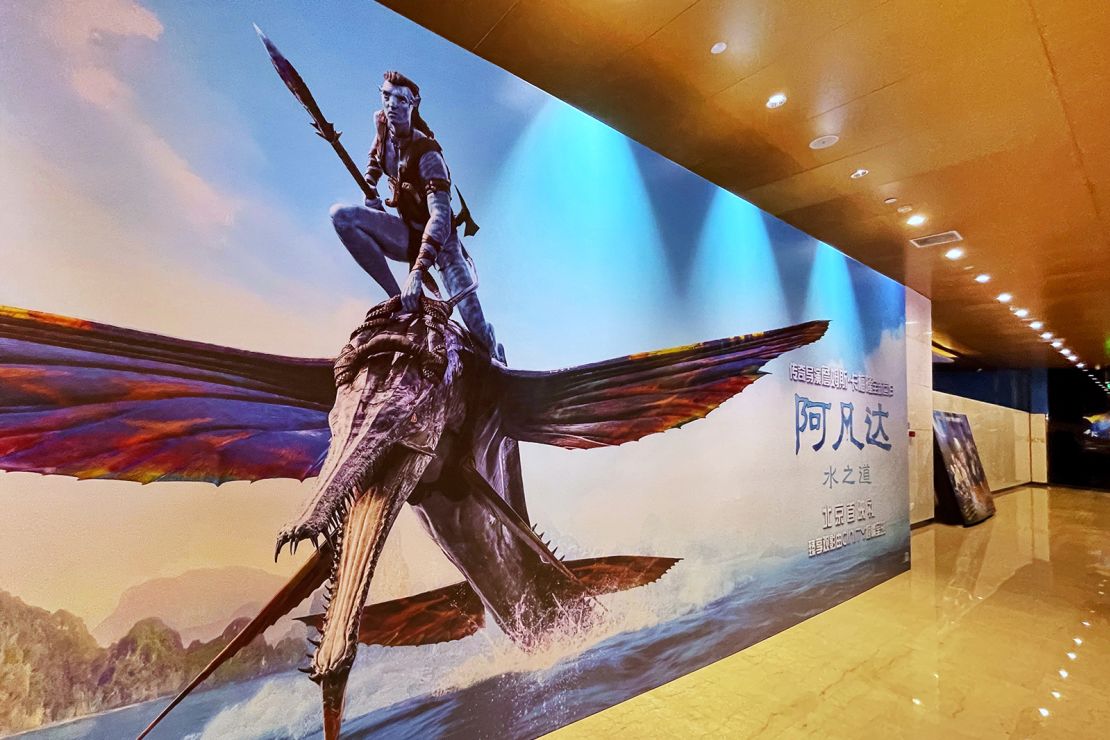James Cameron’s “Avatar: The Way of Water” has premiered in China, 13 years after the original film took the country by storm. It’s expected to be a shot in the arm for the world’s second-biggest film market, which has been battered by the country’s stringent zero-Covid policy.
The highly-anticipated sequel debuted in mainland China on Friday, the same day as its global release. Beijing had previously banned multiple Hollywood films in recent years amid rising US-China tension and tightening censorship of US-related content.
By Friday afternoon, “The Way of Water” had grossed 104 million yuan ($15 million) in its first day of sales, setting this year’s opening day box office record for an international film in China.

More than 1.4 million people have said on ticketing app Maoyan that they “want” to see the sequel, making it the most anticipated film of 2022. Before Friday, it had already crushed the record for advance ticket sales, beating this year’s No.1 box office winner so far, “The Battle at Lake Changjin II.”
“When Avatar 1 was released, I was just in junior high school … I just remember that it was the first time that I watched a 3D film and was deeply shocked by the special effects,” Nissi Hu, who is from the northern Chinese city of Dalian, told CNN.
Afraid of being infected with Covid at the cinema, she put on protective clothing, an N95 mask, and sprayed alcohol on her body and hands while watching the sequel on Friday. The protective clothing felt suffocating during the three-hour screening.
“My 3D glasses were covered with fog, and then I secretly unzipped the protective suit a bit,” she admitted, adding: “I didn’t feel bored. I immersed myself in the plot and enjoyed an unprecedented audio-visual feast.”
Shot in the arm
The “Way of Water” is expected to buoy China’s pandemic-depressed box office. Over the past three years, thousands of cinemas have been forced to suspend business, reopening when the situation improved only to have to shut again. The instability caused many of them to go bankrupt.
By mid-December, China’s box office reached only 28.8 billion yuan ($4.1 billion), down nearly 40% from last year. Today, the country has more than 12,000 cinemas.
“It’s a lifesaver for us,” the state-owned National Business Daily quoted a cinema manager in the eastern city of Jinan as saying late last month.
The premiere comes as China is starting to reemerge following years of aggressive lockdowns and quarantines. Earlier this month, China dismantled parts of its repressive zero-Covid policy after a rare spate of nation-wide protests against pandemic restrictions.
As cities eased curbs, movie theaters opened their doors. On Friday, 9,300 cinemas were open for business, 75% of the country’s total, according to data compiled by Maoyan. That’s up 110% from two weeks ago.
The “Way of Water” accounted for 80% of screenings scheduled for Friday, the Maoyan data showed.
Analysts expect the sequel to bring millions of people back to cinemas and believe it has a high chance of becoming China’s biggest international release ever. China Securities, a Beijing-based brokerage firm, predicted the film could generate 5 billion yuan ($717 million) at the Chinese box office and attract between 80 million to 120 million viewers.
That sum would make “The Way of Water” the No.1 foreign film in China, surpassing “Avengers: Endgame.” In 2019, the Avengers sequel grossed $610 million in China, nearly a quarter of its global sales.
“Avatar 2’s release is a symbolic event for China’s importing of foreign films,” analysts from China Securities said Wednesday. “We expect more Hollywood output to come to China.”
Covid fears
Covid could, however, stand in the way of the film setting a new box office record.
A negative test result is still required at many cinemas across the country. The quick spread of the disease has also kept many residents at home.
“The solid pre-sales data tell us that people have a strong desire to watch Avatar 2,” said analysts from Hangzhou-based Zheshang Securities. “But there’s the risk of them not wanting to go to cinemas fearful of contracting the virus.”
In 2010, the original Avatar premiered in mainland China, immediately setting off a frenzy and resulting in months of ticket shortages, according to state media outlet Paper.cn. The film topped the box office for 11 consecutive weeks and generated $198 million in sales.
More than a decade later, its sequel has generated similar enthusiasm, even if its reception is being tempered by the threat of Covid.










